
Switzerland is not a member state of the European Union (EU). It is associated with the Union through a series of bilateral treaties in which Switzerland has adopted various provisions of European Union law in order to participate in the Union's single market, without joining as a member state. Among Switzerland's neighbouring countries, all but one are EU member states.
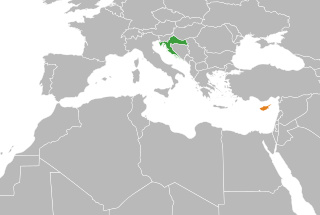
Croatia and Cyprus established diplomatic relations on February 4, 1993. The Croatian embassy in Rome (Italy) is also accredited as a non resident embassy to Cyprus. Croatia has an honorary consulate in Nicosia. The Cypriot embassy in Vienna (Austria) is also accredited as a non resident embassy to Croatia. Cyprus has an honorary consulate in Zagreb. Both countries are full members of the Council of Europe and the European Union. Cyprus joined the EU in 2004, and Croatia joined the EU in 2013.

The Hellenic Republic recognised the Republic of Estonia on May 19, 1922. Greece never recognised the Soviet annexation of Estonia. Both countries re-established diplomatic relations on October 2, 1991. In April 1997, Estonia has established an embassy in Athens. The Greek embassy in Tallinn opened in January 2005. Estonia has also 3 honorary consulates in Patras, Piraeus and Thessaloniki. Both countries are full members of the Council of Europe, the European Union and NATO.

Finnish-Greek relations are foreign relations between Finland and Greece. Greece was among the first countries to recognize the independence of Finland, on January 5, 1918. Both countries established diplomatic relations in 1920. Since February 1, 1977, Finland has had an embassy in Athens. For a long period Finland was represented in Greece through its embassies either in Bucharest, Rome or Belgrade. Finland also has 7 honorary consulates in Kos, Patras, Pireus, Rhodes, Thessaloniki, Heraklion, and Corfu. Greece has an embassy in Helsinki and 4 honorary consulates in Turku, Kuopio, Oulu, and Rovaniemi.

Bulgarian–Turkish relations are foreign relations between Bulgaria and Turkey. Bulgaria has an embassy in Ankara, two general consulates in Istanbul and Edirne and a chancellery in Bursa. Turkey has an embassy in Sofia and two general consulates in Plovdiv and Burgas.

Croatia and Turkey established diplomatic relations in 1992. Turkey recognized independent Croatia in 1991. Croatia has an embassy in Ankara and an consulate-general in Istanbul and an 2 honorary consulates in Antalya and İzmir. Turkey has an embassy in Zagreb. Both countries are full members of Council of Europe and of NATO.

Diplomatic relations between Austria and Bulgaria were established in 1879. Austria has an embassy in Sofia and an honorary consulate in Burgas while Bulgaria has an embassy in Vienna and an honorary consulate in Salzburg.

Croatian–Dutch are foreign relations between Croatia and Netherlands. Both countries established diplomatic relations on April 23, 1992. Croatia has an embassy in The Hague. The Netherlands have an embassy in Zagreb and 3 honorary consulates . Both countries are full members of the Council of Europe, European Union and NATO. Netherlands joined the EU as a founding member state, and Croatia joined the EU in 2013. The Netherlands has given full support to Croatia's membership in the European Union and NATO.

Estonia–Germany relations are foreign relations between Estonia and Germany. Germany first recognised Estonia's independence on 9 July 1921. Both countries re-established diplomatic relations on 28 August 1991.

Bulgaria–Hungary relations are foreign relations between Bulgaria and Hungary. Both independent countries have had diplomatic relations since 1920. They were on the same side during World War I and World War II. Since 2016, the two countries have commemorated their friendly relationship on 19 October, which is known in Bulgaria as the Day of Bulgarian-Hungarian Friendship, and in Hungary as the Day of Hungarian-Bulgarian Friendship.
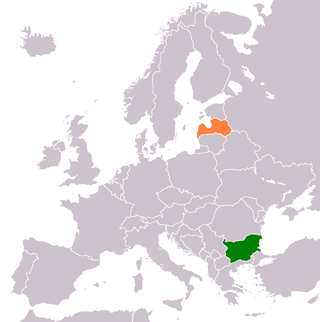
Bulgarian-Latvian relations are foreign relations between Bulgaria and Latvia. Bulgaria is represented in Latvia through its embassy in Warsaw (Poland) and through an honorary consulate in Riga. Latvia is represented in Bulgaria through its embassy in Warsaw (Poland) and through an honorary consulate in Sofia. Both countries are full members of the Council of Europe, the European Union and NATO.
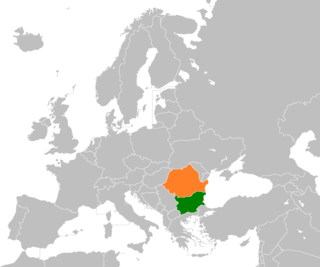
Bulgarian–Romanian relations are foreign relations between Bulgaria and Romania. Bulgaria has an embassy in Bucharest. Romania has an embassy in Sofia and three honorary consulates. There are 7,336 Bulgarians who are living in Romania and around 4,575 Romanians living in Bulgaria. The countries share 608 km of common borders, mostly along the Danube. Both countries are full members of the European Union and NATO. The two countries joined NATO in 2004 and then the European Union in 2007.

Cypriot-Finnish relations are foreign relations between Cyprus and Finland. Finland recognized Cyprus on August 16, 1960. Both countries established diplomatic relations on September 2, 1961. Cyprus has an embassy in Helsinki and an honorary consulate in Vantaa. Finland has an embassy and 2 honorary consulates in Nicosia. The two countries share membership of the European Union, Council of Europe and Organization for Security and Co-operation in Europe.
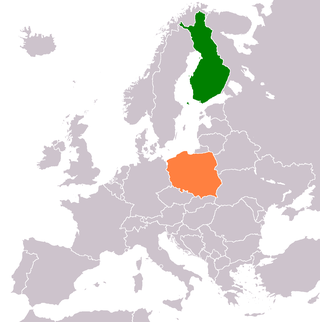
Finland–Poland relations refer to bilateral relations of Finland and Poland. Both countries are members of the European Union, NATO, OECD, OSCE, Council of the Baltic Sea States, HELCOM, Council of Europe and the World Trade Organization. Both countries established diplomatic relations on 8 March 1919. Finland strongly supported Poland's the European Union membership during the latter's accession process. Poland strongly supported Finland's NATO membership during the latter's accession process.
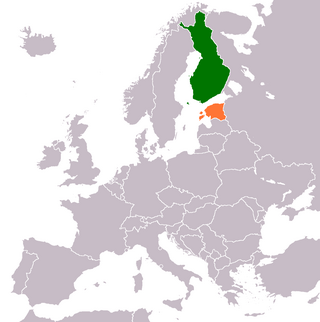
Estonia–Finland relations are foreign relations between Finland and Estonia. The independent Republic of Finland, established in 1917, and the independent Republic of Estonia, established in 1918, established diplomatic relations and formally recognised each other in 1920. Diplomatic relations between the two countries were interrupted during World War II and officially restored on 29 August 1991. Finland has an embassy in Tallinn and an honorary consulate in Tartu. Estonia has an embassy in Helsinki and five honorary consulates, located in Oulu, Turku, Ekenäs, Tampere and Kotka. Both countries are full members of the Council of the Baltic Sea States, Council of Europe, European Union, NATO and the Eurozone. Finland has given full support to Estonia's membership of the European Union. Estonia also has strongly supported Finland's NATO membership. The majority languages in both countries are Finnic languages, as Finland's main language, Finnish, is related to Estonian, and there is and has been a certain feeling of kinship. 76% of Finns have visited Estonia, and in 2004, 1.8 million Finns reported visiting Estonia. The excise tax on alcohol is lower in Estonia than in Finland, thus it is common to buy large volumes of alcohol when returning from Estonia: a study in 2014 indicated that 34% of alcohol sold in Estonia is bought by Finns. Finnish and Swedish investors are the largest foreign investors in Estonia. Both Finland and Estonia are members of the European Union, Schengen agreement and the Eurozone, freeing international travel and trade between the countries. Finland is Estonia's top import partner, accounting for over 15% total import value in 2012, as well as the second-greatest market for Estonia's exports after Sweden. Finland's government recognised Estonia's independence in 1920. In response to the Soviet invasion, diplomatic missions were de facto removed. However, when Estonia restored its independence, this "temporary obstruction" was resolved. During the restoration of Estonia's independence, Finland secretly contributed with significant economic aid and know-how under the cover of "cultural co-operation" in order to not upset the Soviet Union. Finland continues to contribute militarily, such as officers' training, and the provision of equipment.

Dutch–Finnish relations are foreign relations between the Netherlands and Finland. The Netherlands recognised Finland's independence on 28 January 1918. Diplomatic relations between them were established on 14 August 1918. The Netherlands has an embassy in Helsinki and consulates. Finland has an embassy in the Hague, an honorary consulate general in Amsterdam and other honorary consulates in Rotterdam and Terneuzen. Both countries are full members of the Council of Europe, the European Union and NATO. The Netherlands supported Finland's NATO membership during Finland's accession into NATO, which was finalized on 4 April 2023.

Bulgaria–Italy relations are foreign relations between Bulgaria and Italy. Both countries established diplomatic relations in 1879. Bulgaria has an embassy in Rome, a general consulate in Milan and six honorary consulates. Italy has an embassy in Sofia and an honorary consulate in Plovdiv. Both countries are full members of the European Union, NATO, OSCE, Council of Europe and the World Trade Organization. Italy has given full support to Bulgaria's membership in the European Union and NATO.
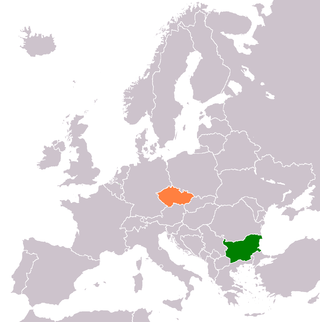
Bulgaria–Czech Republic relations are foreign relations between Bulgaria and the Czech Republic. Diplomatic relations between Bulgaria and Czechoslovakia were established on 27 September 1920, after ratification of Neuilly treaty. They were severed on 1 June 1939 and were restored on 10 October 1945. Interwar relations were deeply influenced by Yugoslavia, Czechoslovakian ally, but Bulgarian rival. Czechoslovakia had to balance between Bulgaria and Yugoslavia. The most important aspect of Bulgaria–Czechoslovakia relationship was trade. The Czechoslovakian interwar export to Bulgaria varied between 3% and 11% of the Bulgarian import. Otherwise it was about 0.5%. Czechoslovakian export was slowly forced out by Germany in the late thirties, but not as much as France or United Kingdom.

Estonia and the United Kingdom are full members of the Council of Europe and NATO.

Croatia–Czech Republic relations are foreign relations between Croatia and the Czech Republic. Croatia has an embassy in Prague and an honorary consulate in Brno. The Czech Republic has an embassy in Zagreb.






















